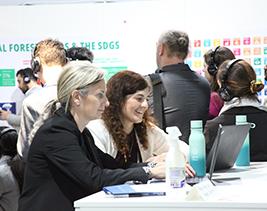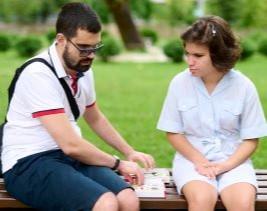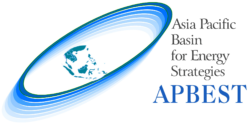
Building our digital future together
There is now little distinction between our offline and online lives. The Internet and digital technologies are so woven into the everyday fabric of societies that losing access—or trust—can feel like the ground shifting beneath us. Yet, 2.6 billion remain offline, left out of opportunities for education, healthcare, and economic growth.
Those who are online face growing threats to their privacy, security, and rights, while rapid changes driven by AI create uncertainty and unease about the future.
This December in Riyadh, the Internet Governance Forum (IGF) convened by the UN Secretary-General will address these issues head-on. The aim? To build a digital ecosystem that works for everyone, everywhere, based on multistakeholder exchanges among diverse communities navigating digital transformation.
Questions like how digital tools can foster peace and sustainability, how we close the connectivity gap, how we mainstream human rights across the digital landscape, and how we ensure AI serves society—not exploits it—are on the agenda. Whether they are government ministers, legislators, youth activists or technical experts, participants come to the IGF as equals. The Forum will foster actionable policy recommendations and deliver impactful messages worldwide.
This year’s Forum comes at a pivotal moment, just months after the adoption of the Global Digital Compact (GDC), which envisions a safer, fairer digital future, and ahead of the WSIS+20 Review in 2025, which will set out new targets for digital development and governance. Both frameworks emphasize the same core idea: digital technologies should be people-centred and approached cooperatively.
As socioeconomic and digital trajectories become interlinked, the need for risk mitigation is clear. But so, too, is the need to tap into the vast ocean of digital possibilities that will help translate technological progress into progress for people and planet.
The IGF holds out promise that global governance and cooperation, harnessing digital solutions for the climate crisis, and combatting threats like misinformation and disinformation – just some of the topics that will be discussed in Riyadh – are all possible.
For more information: Internet Governance Forum (IGF)
Expert Voices
Reflections from the SDG Pavilion at COP29

The SDG Pavilion organized by UN DESA on the sidelines of the UN Climate Change Conference has become an annual stop for many interested in climate and SDG synergies. We spoke with two veterans of the past six SDG Pavilions—Ariel Alexovich, Sustainable Development Officer in UN DESA’s Office of the Under-Secretary-General, and Nadine Salame, Senior Programme Management Assistant in the Division for Sustainable Development Goals—about their recent experience at COP29 in Baku, Azerbaijan.
Set the scene for us: What was the energy like at COP29 and the SDG Pavilion?
AA: “Truly, the energy was fantastic. People were very positive and seemed very happy to see us representing the SDGs with our colourful branding and full programme connecting the world’s climate work with its sustainable development work.
That said, the workday could be quite chaotic. Each day there were multiple sources demanding your attention at once. For instance, there’s the tech team you’ve just met and are trying to get up to speed, there are partners from the event currently on stage asking for a new microphone, there are people from the next event asking about their upcoming PowerPoint, all the while you’re taking photos, distributing headphones to the audience, and fielding hundreds of requests for free SDG pins—it’s a lot. Fortunately, we have each other to rely upon for support.”
There was a vibrant array of voices represented. Can you tell us about the diversity of perspectives and how they enriched conversations?
NS: “With more than 300 applications for about 50 slots, we were grateful that our partners saw the value in holding their events at the SDG Pavilion. Of course we have a good number of UN DESA-led events, but we open our stage to Member States, partners in the UN system and other stakeholders including youth groups and Indigenous organizations.
We especially enjoy working on the SDG Pavilion because we get to work with different teams across UN DESA. Over the years we’ve had events highlighting the special climate challenges facing small island developing States, forests, sustainable transport, climate finance and the climate impacts related to population growth, among others. This year, the special Forest Pavilion was hosted within the SDG Pavilion, making the conversations even more enriching, lively and diverse.”
What were some memorable moments that stood out to you?
NS: “Even though we prepare for the SDG Pavilion for months, a lot of the memorable things happen the day before COP starts, during the set-up. Every year we get to the venue and see firsthand what we’re working with. This year, we had a beautiful booth in a prime location next to UNFCCC and near the host country. However, we were missing a wall, some artwork and the label that actually said, “SDG Pavilion.” So, we do a lot of troubleshooting.
I will also remember Baku. It’s a beautiful city and the COP was very well organized in terms of reliable transport shuttles and very little security queues. We had some excellent meals in the city, too. “
AA: “For sure, I will remember the people we met, like our crew on the ground from India and Germany, and some of the SDG Pavilion visitors who traded pins with us, especially these three women from Uganda with whom I really made a connection.
Otherwise, some highlights were USG Li Junhua’s engagements in the Pavilion on the first day, and I enjoyed interviewing the Special Envoy for the Ocean, several Resident Coordinators, and explorer Bertrand Piccard in our social media space.”
Watch the events broadcast on UN DESA’s YouTube platform here.
A recap of events can also be obtained via the SDG Pavilion newsletter here.
Photo credit: UN DESA
Things You Need To Know

5 things to know about the leadership of persons with disabilities
Image
On 3 December, we celebrate the International Day of Persons with Disabilities (IDPD) under the theme, “Amplifying the Leadership of Persons with Disabilities for an Inclusive and Sustainable Future.” The commemoration will highlight the strides made and the challenges ahead. Here are 5 things you should know about the leadership of persons with disabilities:
1. The leadership of persons with disabilities is based on the principle of “nothing about us without us”
This phrase highlights the crucial need for their participation, representation and inclusion. It emphasizes the importance of their active involvement in decision-making processes to influence the conditions affecting their lives, ensuring that policies and initiatives consider their viewpoints and priorities.
2. Over the years, persons with disabilities and organizations representing them have led important community-driven efforts
These initiatives aim not only to advocate for their rights and well-being but also to promote inclusive development. By using both specific and general approaches, they help improve universal access to essential services and resources. Recent global climate change conferences have demonstrated a growing advocacy for disability inclusion and the rights of persons with disabilities, especially youth with disabilities, in climate action.
3. The global disability rights movement has achieved significant milestones, including the Convention on the Rights of Persons with Disabilities (CRPD) and UN Security Council Resolution 2475
The CRPD is especially important because it incorporates development objectives for persons with disabilities into international human rights frameworks and highlights their leadership in creating this treaty. Resolution 2475 was the first instance where the Security Council focused on the protection and circumstances of persons with disabilities in peace and security situations, highlighting their crucial impact on shaping international policy.
4. The Second World Summit for Social Development in 2025 offers opportunities to enhance leadership among people with disabilities.
The Summit aims to address social development gaps, revitalize the 2030 Agenda, and stress the importance of including persons with disabilities in achieving sustainable peace and development. This year, the UN General Assembly adopted a resolution entitled “Inclusive development for and with persons with disabilities”, calling upon Member States, the UN system and other partners to promote the participation and perspectives of persons with disabilities in the implementation of the 2030 Agenda, and continue to advance disability inclusion across the pillars of the UN’s work.
5. Leadership will be front and center at the commemoration of International Day of Persons with Disabilities
On 3 December, 2024, we celebrate the International Day of Persons with Disabilities (IDPD) under the theme, “Amplifying the Leadership of Persons with Disabilities for an Inclusive and Sustainable Future.” The commemoration at UN Headquarters in New York will highlight the strides made and the challenges ahead, including upcoming key global milestones like the Second World Summit for Social Development in 2025. By harnessing the leadership of persons with disabilities, we can advance towards a future that ensures sustainable peace and inclusive development for all.
For more information: International Day of Persons with Disabilities
Photo Credit: UNDP/Duško Miljanić

MORE FROM UN DESA
- Preparations continue for financing our future
- New report on international migration and sustainable development in time for International Migrants Day
- Turning global goals into local action

Read more here: https://desapublications.un.org/un-desa-voice/december-2024


